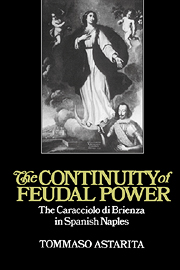Book contents
- Frontmatter
- Contents
- List of plates, figures, and maps
- List of tables
- Acknowledgments
- Note on abbreviations and measurements
- Introduction
- 1 The Caracciolo di Brienza
- 2 Structure and evolution of an aristocratic patrimony
- 3 The management of an aristocratic landed patrimony
- 4 The feudal lord and his vassals: between traditional paternalism and change
- 5 Aristocratic strategies for the preservation of family wealth
- 6 Offices, courts, and taxes; the aristocracy and the Spanish rule
- Conclusion
- Glossary
- Appendix on sources
- Bibliography
- Index
- CAMBRIDGE STUDIES IN EARLY MODERN HISTORY
4 - The feudal lord and his vassals: between traditional paternalism and change
Published online by Cambridge University Press: 28 August 2009
- Frontmatter
- Contents
- List of plates, figures, and maps
- List of tables
- Acknowledgments
- Note on abbreviations and measurements
- Introduction
- 1 The Caracciolo di Brienza
- 2 Structure and evolution of an aristocratic patrimony
- 3 The management of an aristocratic landed patrimony
- 4 The feudal lord and his vassals: between traditional paternalism and change
- 5 Aristocratic strategies for the preservation of family wealth
- 6 Offices, courts, and taxes; the aristocracy and the Spanish rule
- Conclusion
- Glossary
- Appendix on sources
- Bibliography
- Index
- CAMBRIDGE STUDIES IN EARLY MODERN HISTORY
Summary
Beatrice: Rustic people, indiscreet people! It does not befit you to decide the rights of those who are destined to be your masters.
(Goldoni, II feudatario, III, xi)The preceding chapters have discussed the patrimony of the Caracciolo Brienza and have shown the considerable importance that feudal lands and rights had for the barons' income throughout the viceroyal period. The traditionalism and continuity that marked the barons' management of their revenues from the fiefs also characterized other aspects of the relationship between the lord and his vassals. Feudal power affected the communities beyond its strictly economic consequences, and the presence of the lord was not only a burden for the communities but could represent an advantage, due to the paternalism that at times informed feudal rule. The location, population, and economic and social characteristics of the communities, their local traditions of feudal rule, and the ease with which external powers like the church or the central state could intervene between lords and vassals, determined the strength and traits of feudal power. The four communities which constituted the feudal stato of the Caracciolo Brienza differed greatly in the degree and form of their subjection to their lord, and their study allows us, therefore, to discuss the varying conditions of feudal rule in the kingdom of Naples.
- Type
- Chapter
- Information
- The Continuity of Feudal PowerThe Caracciolo Di Brienza in Spanish Naples, pp. 108 - 158Publisher: Cambridge University PressPrint publication year: 1991



